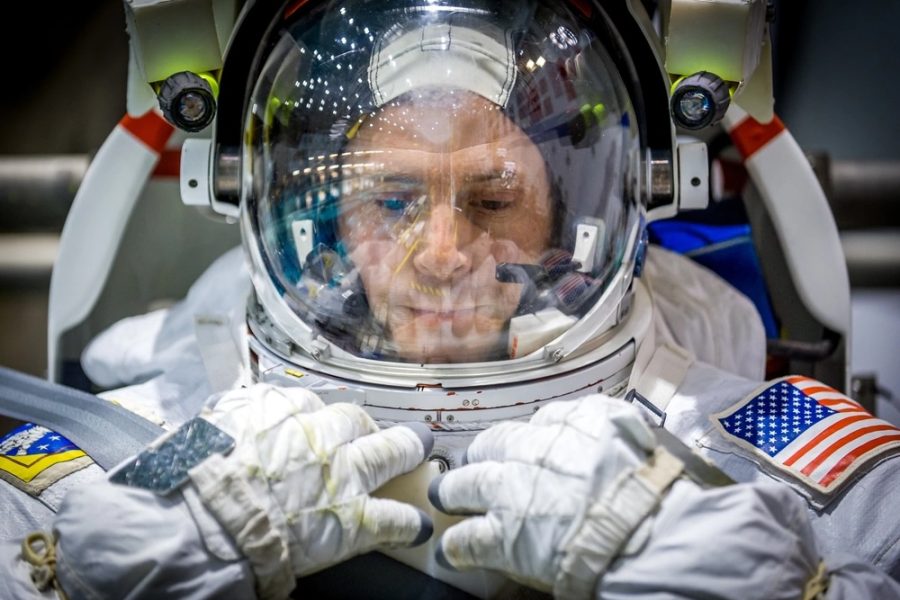
Why The First Guardian to Launch into Space Is Taking Sheet Music with Him (Image Credit: airandspaceforces)
When NASA astronauts go to space, they are allowed to bring a small number of personal possessions with them. Sometimes those include family photos, baseball hats, and even musical instruments. But when Col. Nick Hague becomes the first Guardian to launch into space later this year, he will be taking a special set of sheet music along with him.
“In terms of culture, one of the things the Space Force spent a lot of time on was the Space Force song,” Hague told reporters at a media roundtable March 28. “So I’m taking up a couple original sheets of music from the Space Force song and I’ll get them back to the band members and composers that helped craft that.”
Each U.S. military branch has a song, and the Space Force unveiled its own at AFA’s Air, Space, and Cyber Conference in 2022. Named after the Space Force motto “Semper Supra,” (Latin for ‘Always Above’) the song took years of work.
“I knew they wanted something that was singable and that fit with the other anthems—the other service songs—and that would be something that could last,” Jamie Teachenor, who composed the song, told Air & Space Forces Magazine. A former member of the U.S. Air Force Academy’s country band, Teachenor worked on the song with then-Chief of Space Operations Gen. John “Jay” Raymond and Coast Guard Chief Musician Sean Nelson to arrange it for performance.
Besides sheet music, Hague is also taking up Space Force flags, patches, and other mementos from Space Force units that make space exploration possible. He plans on bringing the keepsakes back to those units when he returns.
“Those satellites that they’re operating, those are the capabilities that underpin us being able to even get to orbit,” he said. “They help track all the stuff that we could run into, they help guide us through space with GPS, space domain awareness, and understanding where we’re at and where we’re going.”
Besides bringing up mementos, Hague plans on reaching out to Guardians privately from space to “let them know what kind of impact they’re having on us.” He will be in orbit when the branch celebrates its fifth birthday on Dec. 20.
Hague is not the first Guardian in space; Col. Michael Hopkins took that honor when he transferred into the Space Force in 2020 while aboard the International Space Station. For the most part, Guardians control satellites from the ground, but Hague will be the first to launch into space when he and three crewmates ride a Space X Dragon out of Kennedy Space Center, Fla., up to the ISS. The mission is expected to launch in August.
The mission will last six months, much of which will be filled up with scientific experiments. Though the exact kind of experiments are still being determined, astronauts are trained on certain sets of skills, and scientists build experiments to work within that skillset, Hague explained. On his past trip to space, some of those involved 3D-printing human tissue and genome editing.
“It’s almost like Christmas every day up there, because you’re opening a cargo bag and pulling out a new experiment that you’ve never seen before,” he said. “But we train to have the basic skills to be able to do those, so we’re ready when they [the scientists] need it.”
Hopefully this trip will be less dramatic than his first mission. In 2018, Hague and his crewmate, cosmonaut Alexey Ovchinin, had just launched from the Baikonur Cosmodrome in Kazakhstan when their Soyuz spacecraft suffered a catastrophic rocket booster malfunction, forcing an abort.
“The rocket essentially disintegrated under us,” Hague told reporters.
But just five months later, Hague was back in a Soyuz, which this time successfully took him up to the ISS for a 203-day stay. The difference between the 1960s-era Soyuz and the modern Dragon spacecraft is “night and day,” he said, as the Dragon features more automation designed to reduce the burden on the operator, as well as “a much more comfortable seat.” But the colonel expects the butterflies in his stomach to be the same as that first launch.
“Space is a risky business,” he said. “We train for everything that we can envision going wrong and what to do in those scenarios.”
The training leads to a kind of double-awareness where crews enjoy the launch and the space mission but are also vigilant at all times for “the next thing that could go wrong,” he said. That may be even more true if Hague goes on a space walk, perhaps to install hardware for mounting new solar arrays on the ISS.
“It’s all those things I dreamed of when I was five years old. I’m just out there holding on to a space station zipping through space at five miles a second, watching the Earth coast by,” said Hague, a veteran of three prior space walks. “It’s pretty phenomenal.”
As NASA prepares to send astronauts back to the Moon and, eventually, to Mars, the agency is hiring new astronauts to make the journey. Hague pushed his fellow Guardians to apply for both the astronaut program and for NASA positions in general. April 16 is this year’s application deadline for hopeful astronauts.
“I think Guardians need to recognize that they work in complex control rooms, managing dynamic teams, trying to handle technical problems as they approach,” he said. “If you look at that skill set, and you look at what we do in Mission Control, at Johnson Space Center, they are analogous. So somebody who has that, is a really great teammate, handles pressure well, and can adapt to things as they change. Those are perfect candidates.
“Nine times out of 10, what I find is that people think, ‘the requirements are so high, nobody’s ever going to select me,’” he added. “Make us say no. Put in an application.”








